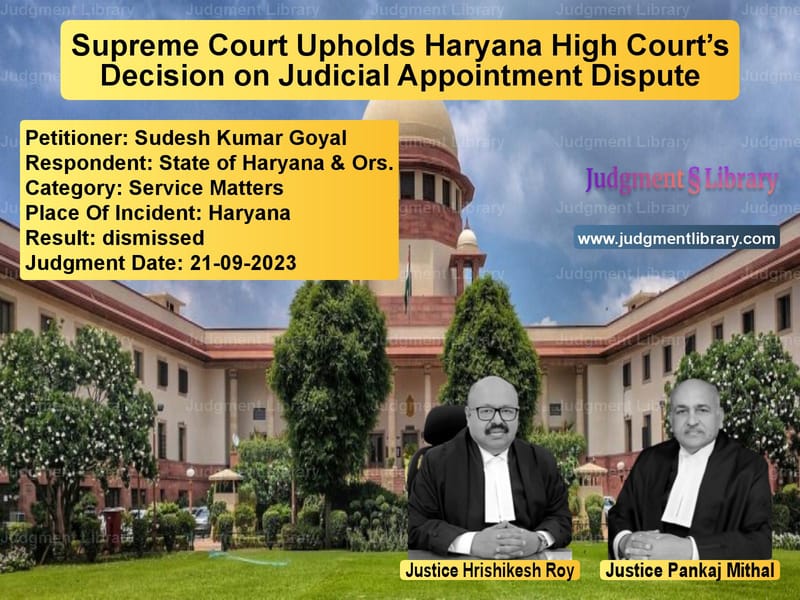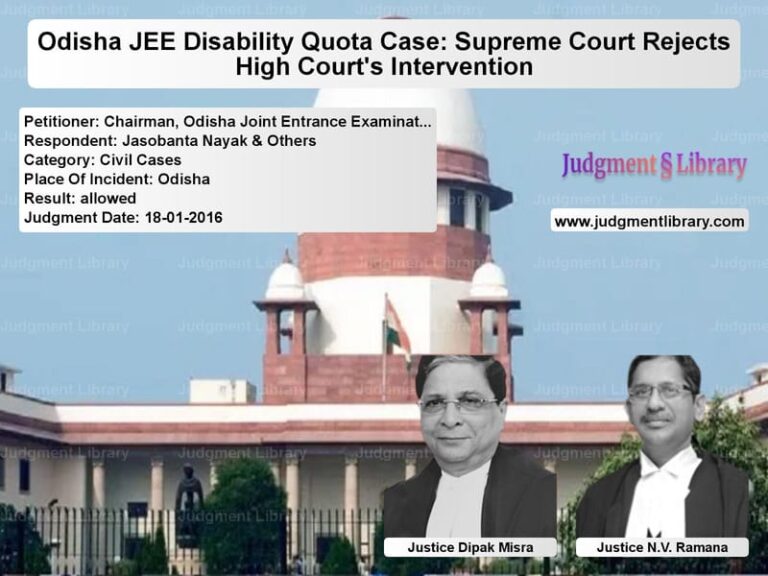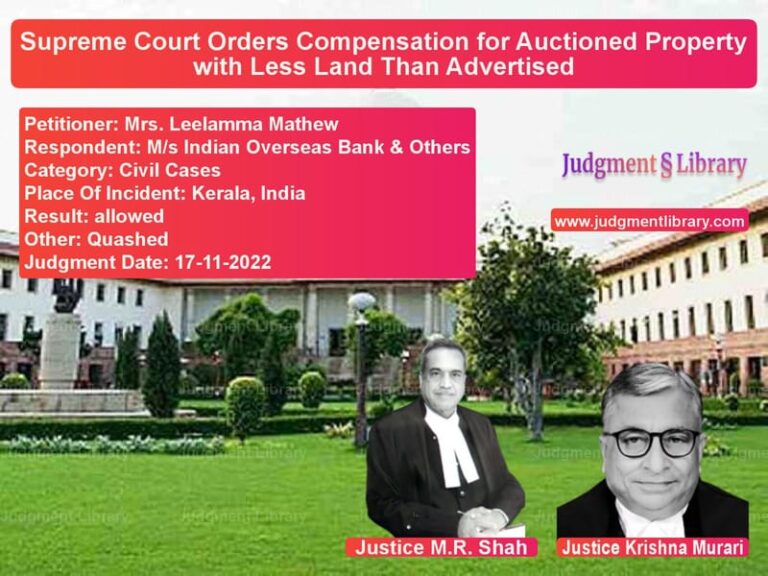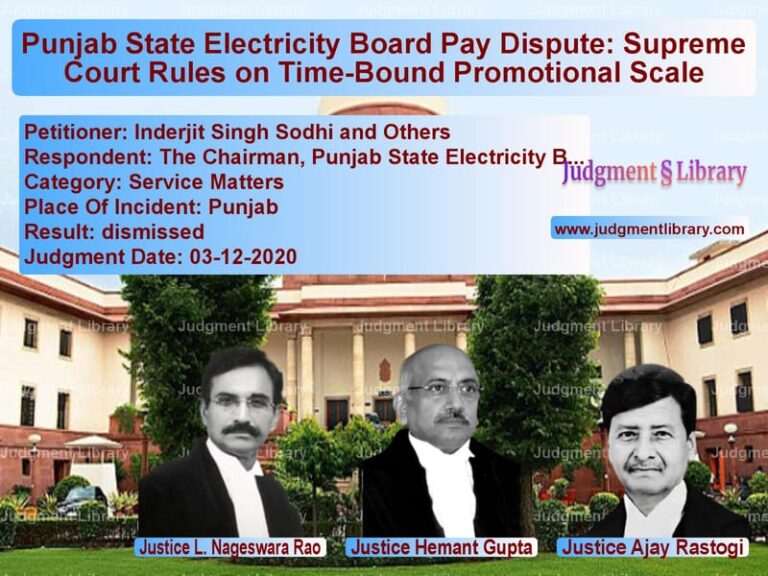Supreme Court Upholds Haryana High Court’s Decision on Judicial Appointment Dispute
The Supreme Court of India recently ruled in the case of Sudesh Kumar Goyal vs. State of Haryana & Ors., rejecting the appeal filed by the petitioner against the Haryana High Court’s decision regarding his appointment in the Haryana Superior Judicial Service. The judgment highlights key legal principles regarding appointment rights, judicial selection processes, and the validity of administrative decisions in recruitment matters.
Background of the Case
The Punjab & Haryana High Court issued a notification on 18 May 2007 for the recruitment of 22 officers in the Haryana Superior Judicial Service through direct recruitment from the Bar. The distribution of seats was as follows:
- 14 seats for general category candidates
- 5 seats for Scheduled Caste (SC) candidates
- 3 seats for Backward Class (BC) candidates
The selection was to be conducted per the Haryana Superior Judicial Service Rules, 2007, within the 25% quota for direct recruitment from the Bar. The appellant, Sudesh Kumar Goyal, participated in the selection process, successfully cleared the written examination and interview, and was ranked 14th on the general category merit list. However, despite his qualification, he was not appointed.
Reasons for Non-Appointment
While the first 13 candidates from the merit list were appointed, the 14th vacancy remained unfilled. The appellant challenged this non-appointment on the grounds that:
- The 14th seat was unfairly left vacant.
- The authorities arbitrarily denied him the position despite his eligibility.
- One selected candidate, Jitender Kumar Sinha, resigned after joining, thereby creating another vacancy that should have been offered to the appellant.
Arguments by the Petitioner
The petitioner contended that the decision to leave the 14th general category seat vacant was arbitrary and in violation of the principles established in Shankarsan Dash v. Union of India (1991) 3 SCC 47. He relied on the judgment’s ruling that, while selection does not guarantee appointment, the decision not to appoint a selected candidate must be fair and reasonable.
The petitioner’s counsel, Shri Rakesh Dahiya, argued:
- The Haryana Government’s action in keeping the 14th post vacant was unjustified.
- The decision lacked a legitimate rationale and was arbitrary.
- Given that one appointee resigned, the appellant should have been accommodated against the resultant vacancy.
Arguments by the Respondents
The respondents, represented by Senior Counsel Shri Raju Ramachandran, countered the claims with the following points:
- Though 14 general category seats were originally advertised, 5 positions were later filled through the absorption of Fast Track Court (FTC) judges, reducing the available general category seats from 14 to 9.
- Subsequently, 4 additional vacancies emerged, increasing the number of available seats to 13.
- Since only 13 general category vacancies remained after adjustments, the appellant, ranked 14th, was ineligible for appointment.
- The decision was made in compliance with Brij Mohan Lal (1) v. Union of India (2002) 2 SCC 1 and Brij Mohan Lal (2) v. Union of India (2012) 6 SCC 502, which guided the absorption of FTC judges into the regular cadre.
Supreme Court’s Observations
The Supreme Court, comprising Justices Hrishikesh Roy and Pankaj Mithal, examined the legality of the respondent’s decision and found no arbitrariness in their actions. The Court made the following key observations:
1. No Indefeasible Right to Appointment
The Court reaffirmed the principle from Shankarsan Dash, stating:
“Merely clearing an examination or being placed on a merit list does not grant a candidate an indefeasible right to appointment.”
While the appellant had performed well, the final decision on filling the advertised vacancies rested with the employer.
2. Justification for Vacancy Adjustments
The Court upheld the respondent’s argument that FTC judges were absorbed into regular service based on judicial directives. This justified the reduction of general category vacancies from 14 to 9.
The Court observed:
“The adjustment of Fast Track Court judges into the Superior Judicial Service was in accordance with law and did not reflect an arbitrary exercise of power.”
3. Resignation Does Not Create Automatic Vacancy
The Supreme Court rejected the argument that the appellant should have been appointed following Jitender Kumar Sinha’s resignation.
It ruled:
“Once all advertised vacancies are filled, a subsequent resignation does not automatically entitle the next candidate on the merit list to appointment. A fresh selection process is required.”
4. Litigation Must Have Finality
The Court noted that the recruitment process began in 2007, and nearly 16 years had passed. Prolonging the dispute further would serve no purpose.
The judgment stated:
“It would be a travesty of justice to keep a selection process open for such an extended period.”
Final Verdict
Based on these findings, the Supreme Court dismissed the appeal, concluding that:
- The respondents acted within legal and procedural boundaries.
- The decision to appoint only 13 general category candidates was justified.
- The appellant had no vested right to appointment.
- The appeal lacked merit and was dismissed without costs.
Implications of the Judgment
This ruling has several implications for future recruitment and appointment cases:
- No Automatic Right to Appointment: Merely being on a merit list does not guarantee selection.
- Judicial Directives Can Influence Recruitment: Absorption of FTC judges was prioritized based on legal precedent.
- Vacancies Must Be Managed Transparently: The decision to fill only 13 vacancies was upheld as reasonable and legally sound.
- Finality in Litigation: Courts discourage prolonged litigation in recruitment matters.
Conclusion
The Supreme Court’s verdict in Sudesh Kumar Goyal vs. State of Haryana reinforces that recruitment processes must be governed by legal principles and administrative fairness. The ruling confirms that while merit matters, final appointments depend on organizational requirements and judicial directives.
By upholding the Haryana High Court’s decision, the Supreme Court has reaffirmed that vacancies, if not filled, must be backed by reasonable justification and should not be arbitrarily denied. This case serves as a guiding precedent for future disputes in judicial recruitment and public service appointments.
Petitioner Name: Sudesh Kumar Goyal.Respondent Name: State of Haryana & Ors..Judgment By: Justice Hrishikesh Roy, Justice Pankaj Mithal.Place Of Incident: Haryana.Judgment Date: 21-09-2023.
Don’t miss out on the full details! Download the complete judgment in PDF format below and gain valuable insights instantly!
Download Judgment: sudesh-kumar-goyal-vs-state-of-haryana-&-o-supreme-court-of-india-judgment-dated-21-09-2023.pdf
Directly Download Judgment: Directly download this Judgment
See all petitions in Recruitment Policies
See all petitions in Public Sector Employees
See all petitions in Promotion Cases
See all petitions in Judgment by Hrishikesh Roy
See all petitions in Judgment by Pankaj Mithal
See all petitions in dismissed
See all petitions in supreme court of India judgments September 2023
See all petitions in 2023 judgments
See all posts in Service Matters Category
See all allowed petitions in Service Matters Category
See all Dismissed petitions in Service Matters Category
See all partially allowed petitions in Service Matters Category







